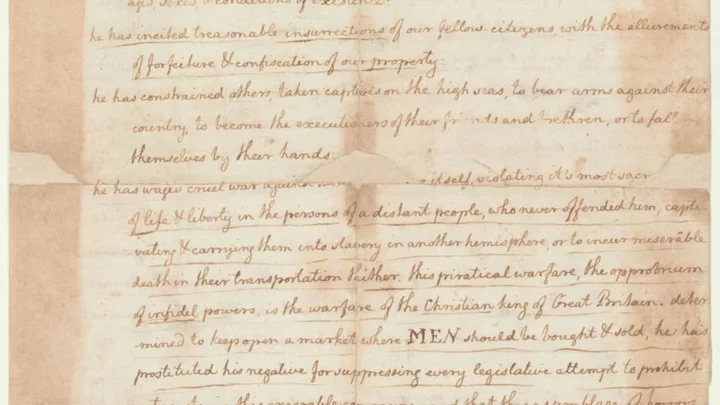In 1776, the Continental Congress ratified the Declaration of Independence. But the document you know and can probably recite from memory (at least partially) is much different from what Thomas Jefferson—the primary author in a committee of five men (including John Adams and Benjamin Franklin) commissioned to draft the document—originally wrote.
Jefferson submitted the “rough draught” of the Declaration of Independence to the Second Continental Congress on June 28, 1776. Delegates argued the details of the document for two days before making a number of changes to it—and Jefferson was not pleased. In the days after the document was ratified, the founding father handwrote several copies of his original version, underlining what had been changed, and sent them off to several friends.
Most of the changes were made to the last half of the document; notably, the following passage, which referred to slavery, was omitted to mollify delegates from Georgia and South Carolina. Of the king, Jefferson wrote (bold indicates an underlined portion):
“[H]e has waged cruel war against human nature itself, violating its most sacred rights of life & liberty in the persons of a distant people, who never offended him, captivating & carrying them into slavery in another hemisphere, or to incur miserable death in their transportation thither. this piratical warfare, the opprobrium of infidel powers, is the warfare of the Christian king of Great Britain. determined to keep open a market where MEN should be bought & sold, he has prostituted his negative for suppressing every legislative attempt to prohibit or to restrain this execrable commerce: and that this assemblage of horrors might want no fact of distinguished dye, he is now exciting those very people to rise in arms among us, and to purchase that liberty of which he has deprived them by murdering the people upon whom he also obtruded them; thus paying off former crimes committed against the liberties of one people, with crimes which he urges them to commit against the lives of another.”
Also omitted was this rallying cry (again, emphasis Jefferson’s):
“[W]e might have been a free & a great people together; but a communication of grandeur and of freedom, it seems, is below their dignity. be it so, since they will have it: the road to happiness and to glory is open to us too; we will climb it apart from them, and acquiesce in the necessity which denounces our eternal separation!”
Each year before the Fourth of July, the New York Public Library puts its copy—from which this text is taken, one of only four to survive—on display; you can get a closer look at it yourself here.
The library added this “fair copy” to its collections in 1897, and can follow its ownership back to Cassius F. Lee of Alexandria, Virginia. It may have been the copy that Jefferson sent to his former law professor George Wythe, though it’s never been proven.
A version of this story ran in 2014; it has been updated for 2023.
This article was originally published on www.mentalfloss.com as The Original Version of the Declaration of Independence.

